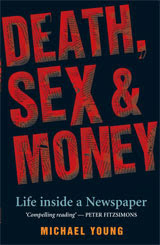 Michael Young's "Death, Sex & Money: Life inside a Newspaper" carries a blurb from The Sydney Morning Herald's Peter FitzSimons on the front cover describing it as "Compelling reading", which is not so surprising when you find Fitzy described adoringly as the "legendary Peter FitzSimons" on P.79.
Michael Young's "Death, Sex & Money: Life inside a Newspaper" carries a blurb from The Sydney Morning Herald's Peter FitzSimons on the front cover describing it as "Compelling reading", which is not so surprising when you find Fitzy described adoringly as the "legendary Peter FitzSimons" on P.79.It's a quick read with some entertaining anecdotes about the characters - mostly unnamed and mostly from The Sydney Morning Herald - who populate Australian newspaper newsrooms.
However, it's somewhat backward looking. It reeks of nostalgia for the glory days of print.
But that's OK. Pre-internet newspapers were something to behold. Of course they still have a place, but that place is changing radically.
Despite his sentimental attachment to print, Young does explore some of the questions for newspapers around the challenges of the digital age. Sort of:
"The print product will retain one distinct advantage over the internet - credibility - and while such credibility remains, the traditional media will continue to influence and form public opinion."The problem here, of course, is that he confuses the whole of the internet with specific elements of media discourse.
A recurring theme through the book is that the internet is not to be trusted. By which he means that not all the information one finds on the internet is trustworthy or reliable. This is a bit of a straw man and really only exposes Young and the many Australian newspaper editors he quotes as uncomfortable and somewhat lost in a digital environment.
He asks: "Who will survive in this competitive environment?"
"Different media groups argue their specific corners. Tabloids argue that they will survive because they understand exactly what their readership wants from the net and are well placed to deliver infotainment and celebrity news with short snappy news headlines. This, they say, is what they are good at, and they can easily adapt their content to the cyber-environment. Broadsheet editors see this as a flawed rationale. The net, they argue, is already saturated with this world of infotainment and instant gratification, and that tabloids are simply repeating ad nauseam what is already available on the net in bucket-loads. The way forward, they argue, is to use the multiple technology platforms to deliver quality journalism and content in various guises, each developed to fit the medium that carries the message. This is the view of Fairfax."Young is clearly a broadsheet kind of guy, but his analysis of this brave new world towards which Fairfax editors are charging is lacking in any economic context or feel for the culture of the web and it's digital extensions. It's all a little too corporate and anodyne.
News Ltd, of course, is a different beast.
"The Australian takes a contrary view and sees middle-brow newspapers such as those published by Fairfax as most vulnerable because of what it describes as the group's move towards 'fridge-door' journalism that confuses infotainment with news. The Australian claims that its own core value of editorial quality is the model that will endure. But The Australian, although sporting a strong web site, seems bereft of a strategy that embraces the inclusive new media landscape and its weakness lies in its mission, as a national newspaper, of trying to be all things to all people."Note the reference to "inclusive new media landscape". Unfortunately, it's easy to write but more difficult to actually explain this concept in the context of current major Australian news sites. And Young doesn't really try.
"The malaise that afflicts The Australian is one that has permeated through the organisation from the top down in the parent group's slow uptake of the net's benefits. Les Hinton, Murdoch's trusted lieutenant who runs News Corp's British newspapers (the very newspapers that lectured News Limited's Australian executives on how best to tackle the net), said in an interview with Media Guardian that News Corp failed to understand how the web works and is still trying to develop a way to make money out of the web."I don't think this is an accurate reading of News and its attitude towards online publishing. It's also an inaccurate reference to a video conference that took place on the evening of July 17 last year.
On P.179 Young writes:
"In mid-2006 Rebekah Wade, editor of The Sun, and Robert Thompson, editor of The Times (whose site is far more sober than that of the Sun), addressed a key group of Australian news executives by video from London. The thirty-two executives gathered in a television conference room in Sydney to hear Wade and Thompson extol the virtues of their web sites. Every editor of every Murdoch Australian paper attended this lesson in global communications."I was at that meeting, and Young's account is wrong on a number of points:
- Les Hinton didn't lecture anyone. After initial introductions he sat quietly in the background while Rebekah Wade and Robert Thompson spoke. And they didn't lecture anyone, either.
- Wade and Thompson didn't extol the virtues of their web sites. On the contrary there was a frank and open discussion about the specific challenges all were facing in terms of newsroom management, production operations and the effects of the new environment on the journalism their newspapers produced.
- The meeting was not attended by every News Ltd editor but only by the metropolitan newspaper editors and online editors.
No comments:
Post a Comment